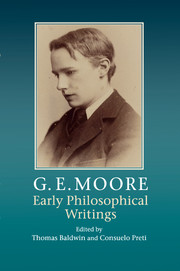Book contents
- Frontmatter
- Contents
- Preface
- Abbreviations and notes
- Editors' introduction
- THE 1897 DISSERTATION: THE METAPHYSICAL BASIS OF ETHICS
- EXAMINERS' REPORTS ON THE 1897 DISSERTATION
- H. S. on G. E. Moore, Dissertation on the Metaphysical Basis of Ethics
- Report on Mr. Moore's Essay
- THE 1898 DISSERTATION: THE METAPHYSICAL BASIS OF ETHICS
- EXAMINER'S REPORT ON THE 1898 DISSERTATION
- Index
H. S. on G. E. Moore, Dissertation on the Metaphysical Basis of Ethics
Published online by Cambridge University Press: 05 June 2012
- Frontmatter
- Contents
- Preface
- Abbreviations and notes
- Editors' introduction
- THE 1897 DISSERTATION: THE METAPHYSICAL BASIS OF ETHICS
- EXAMINERS' REPORTS ON THE 1897 DISSERTATION
- H. S. on G. E. Moore, Dissertation on the Metaphysical Basis of Ethics
- Report on Mr. Moore's Essay
- THE 1898 DISSERTATION: THE METAPHYSICAL BASIS OF ETHICS
- EXAMINER'S REPORT ON THE 1898 DISSERTATION
- Index
Summary
Mr. Moore's Dissertation is on the ‘Metaphysical Basis of Ethics’. It only covers, as he says, a small part of the ground which he had marked out for it. It's [sic] main part (97 pages) consists of ‘a chapter on Freedom with special reference to Kant’; but about 1/5 of it, including 10 pages of this chapter, consists of criticism, on my views. I propose to confine my remarks to that part of the Dissertation in which Mr. Moore criticizes Kant or expounds his own views as I am able to judge this more impartially: but I may say generally that the part relating to me has certainly the same merits and perhaps the same defects as the rest of his initial work.
The ability shown in the dissertation seems to me of a high order; quite first-rate, in respect of critical acumen and dialectical vigour, and independence of thought; and at least very promising in respect of philosophical grasp and penetration. Mr. Moore, however, is in my opinion more successful in making points against particular statements of Kant, than in understanding his views as a whole, where that understanding is rendered difficult and complicated by [the] discrepancy between the old ideas that Kant retains and the new ones that he is introducing. At the same time he has a thorough grasp of Kant's main conception and his criticism is almost always close and penetrating and of value in the way of suggestion even when he seems to miss Kant's real view.
- Type
- Chapter
- Information
- G. E. Moore: Early Philosophical Writings , pp. 97 - 98Publisher: Cambridge University PressPrint publication year: 2011

